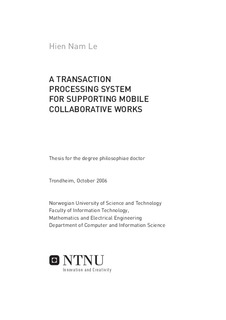| dc.description.abstract | The theme of this research is mobile transaction processing systems, focusing on versatile data sharing mechanisms in volatile mobile environments.
The rapid growth of wireless network technologies and portable computing devices has promoted a new mobile working environment. A mobile environment is different from the traditional distributed environment due to its unique characteristics: the mobility of users or computers, the frequent and unpredictable disconnections of wireless networks, and the resource constraints of mobile computing devices.
On the one hand, the mobile environment promotes a new working model, i.e., people can carry out their work while being on the move. The environment for accessing and processing information is changing rapidly from stationary and location dependent to mobile and location independent. On the other hand, these unique characteristics of the mobile environment pose many challenges to mobile transaction processing systems, especially in terms of long delaying periods, data unavailability and data inconsistency.
Many research proposals that focus on supporting transaction processing in mobile environments have been developed. However, there are still major issues that have not been completely solved. One of the problems is to support the sharing of data among transactions in volatile mobile environments. Our solution is to provide the mobile transaction processing system with flexible and adaptable data sharing mechanisms that can cope with the dynamic changes of the surrounding environmental conditions while ensuring data consistency of the database systems.
The results of our research consist of three important contributions:
The first contribution is a versatile mobile data sharing mechanism. This is achieved by the concepts of the mobile affiliation workgroup model that focuses on supporting mobile collaborative work in the horizontal dimension. The mobile affiliation workgroup model allows mobile hosts to form temporary and dynamic mobile workgroups by taking advantage of wireless communication technologies, i.e., the ability of direct communication among nearby mobile hosts. The data sharing processes among transactions at different mobile hosts are carried out by shared transactions, called export and import transactions. These shared transactions interact through a mobile sharing workspace, called an export-import repository. Data consistency of the database systems is assured by either serialization of transactions or applying user-defined policies. Our mobile data sharing mechanism provides an adaptable way for increasing data availability, while taking into account all the important characteristics of mobile environments, which are: the mobility of computing hosts, the frequent and unpredictable disconnections of wireless networks, and the resource constraints of mobile computing devices. Therefore, it has the ability to increase the throughput of mobile transaction processing systems.
The second contribution is a data conflict awareness mechanism that supports mobile transactions to be aware of conflicts among database operations in mobile environments. The data conflict awareness mechanism is developed based on the concepts of the anchor transaction that plays the role of a proxy transaction for local transactions at a disconnected mobile host. With the support of the data conflict awareness mechanism, the mobile transaction processing system has the capacity to minimize delay of transaction processes and to enforce consistency of the databas systems.
The third contribution is a mobility control mechanism that supports the mobile transaction processing system to efficiently handle the movement of transactions in mobile environments. We distinguish two types of transaction mobility in accordance with: (1) the movement of mobile hosts through mobile cells, and (2) the movement of mobile hosts across mobile affiliation workgroups. The mobility of transactions through mobile cells is handled by movement of the anchor transaction. While the mobility of transactions across mobile affiliation workgroups is controlled by the dynamic structure of export and import transactions.
We have developed a mobile transaction processing system for MOWAHS. Especially, we have successfully designed, implemented, and tested several important system components such as the mobile locking system and the mobile data sharing system. | nb_NO |
